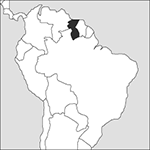
Source: MAPS IN MINUTES™ © RH Publications (1997)
Capital:
Georgetown
Area:
214,969 sq km (83,000 sq miles)
Population:
739,903 (2013 est)
Currency:
1 Guyana dollar=100 cents
Religions:
Protestant 30.5%; Hindu 28.4%; Roman Catholic 8.1%; other Christian 18.8%; Muslim 7.2%
Ethnic Groups:
East Indian 43.5%; Black 30.2%; Mixed 16.7%; Amerindian 9.1%
Languages:
English (official); English creole; also Amerindian languages, Hindi, and Urdu
International Organizations:
UN; Commonwealth; CARICOM; Non-Aligned Movement; OAS; WTO
A country on the north-east coast of South America, extending for 800 km (500 miles) from north to south and for 460 km (285 miles) from east to west.
Physical
Guyana is bordered by the Atlantic Ocean to the north, Surinam to the east, Brazil to the south and south-west, and Venezuela to the west. Much of the country is covered with dense rainforest.
Economy
The economy is based on agriculture and mining. Major exports are sugar (the province of Demerara gave its name to a type of sugar that originated there), gold, bauxite, shrimp, timber, and rice. Recently discovered offshore oil and gas resources are expected to transform the economy from 2020.
History
The country was first settled by the Dutch in the 17th century. British rule was formally secured in 1831 when three colonies, Essequibo, Demerara, and Berbice (named from the three rivers) were consolidated to form the crown colony of British Guiana. Boundary problems with neighbours dominated the 19th century. During World War II the lease of military and naval bases to the USA proved useful to the Allied war effort. Britain granted independence to the colony in 1966 and Guyana became a nominally cooperative republic in 1970. Its Prime Minister, Forbes Burnham, became executive President (1980–86) with supreme authority under an authoritarian constitution. He was succeeded by Desmond Hoyte, who embarked on a policy of restoring good relations with the USA by a ‘rolling back of cooperative socialism’. Hoyte survived an IMF-imposed austerity programme, but in December 1991 proclaimed a state of emergency, postponing a general election. In the general election of October 1992 a victory by the People’s Progressive Party, under Cheddi Jagan, ended 28 years of rule by the People’s National Congress. The new government pledged to follow the free market policies of the previous administration, while the country continued to experience a protracted economic crisis. In 1997 Jagan died and his widow Janet was elected President. She was succeeded in 1999 by Bharrat Jagdeo, who was re-elected in 2001 and 2006. Donald Ramotar was elected President in 2011 though he lost ground and he headed a minority administration. Following a vote of no confidence in his government, Ramotar called a new election in May 2015, which was won by David Granger of the multiracial Partnership for National Unity and Alliance for Change coalition. Venezuela’s historic claim to much of Guyana was reawakened by significant oil discoveries off the coast, leading Guyana to seek UN help to end the dispute.
- Troy
- TRP protein
- TRS
- TR switch
- Trucial States
- Truck Acts
- Trudeau, Pierre (1919–2000)
- true age
- true and fair view
- true anomaly
- TrueColor
- true complement
- true dip
- true equator
- true equinox
- true pole
- true-positive rate
- true thickness
- TrueType font
- Trujillo, Rafael (1891–1961)
- Truly, Richard Harrison (1937– )
- Truman Doctrine (1947)
- Truman, Harry S (1884–1972)
- managed device
- managed floating exchange rate